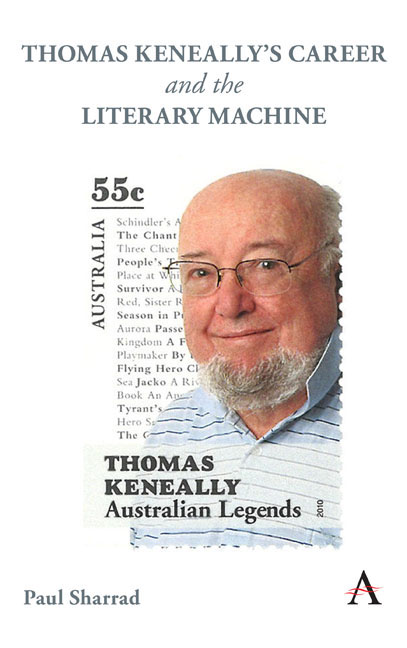Chapter Two - The Collins Years
Published online by Cambridge University Press: 04 October 2019
Summary
In September 1970, the Keneally family went to England for a year on a trip subsidized by The Bulletin in return for some travel articles. Tom soaked up the vibrant arts scene, mixing with expatriates Clive James and Barry Humphries. He encountered other colourful characters who would eventually find their way into his fiction, and he travelled in Ireland and Europe, tracking the places and history he'd read about. His world was expanding, and sustaining a wider readership presented a challenge. British book culture and a burgeoning Australian literature favoured literary work that would garner critical regard; personal need and the American market suggested commercial success was the better goal. How would the career path progress?
In Australia, readers had approved of Keneally's more accessible style, but if he was renouncing arty excess, he didn't like social realist work much either. Finding his own voice between the two modes carried the risk of satisfying the tastes of neither the new professional class shaping an Australian literary canon nor readers who preferred reading Kylie Tennant and Frank Clune. Overseas, however, some literary style would be appreciated, particularly if its setting was more familiar. Getting better access to the bigger markets was the key.
William Collins had established a Sydney office that began creating a substantial Australian list and also acquired a significant interest in Angus & Robertson. After Keneally returned to Sydney, Sir William came to Australia to check on his investments. He lunched with Keneally and they got on well. Technology now existed for easy transport of printing plates, so an author could release a new title almost simultaneously in London and Sydney, supporting national cultural production while also building an international reputation. With the changes happening at A&R, moving to Collins was an easy choice, though one with its own challenges.
Keneally was aware he might be seen by Australians as selling out to the Old World, but A&R research director Jeff Prentice started a refrain that would repeat across Keneally's career moves: ‘I always took the view that A&R could have done more promotion for your books.’ Tussles between seeking literary recognition, especially in Australia, and garnering a viable income from good marketing, both at home and abroad, becomes a hallmark of Keneally's career.
- Type
- Chapter
- Information
- Thomas Keneally's Career and the Literary Machine , pp. 55 - 90Publisher: Anthem PressPrint publication year: 2019

